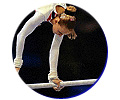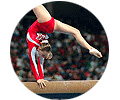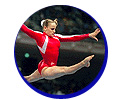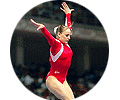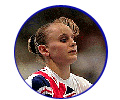
Annika
was first noticed by the gymnastics world, at the 1991 Weetabix British
Junior Gymnast of the Year. As a sprightly 12-year-old, Annika won this
competition easily, and became known as a future star for British gymnastics.
Her skill level at such an early age was incredible, and hardly seen in
Great Britain previously (if at all).
Two years later, Annika competed in the Junior European Championships,
and placed a sound 29th all around. Annika had arrived on the international
scene.
Although still relatively unknown and inexperienced internationally, Annika
qualified as part of the British team for the 1994 World Championships
in Brisbane, Australia. By this stage, it was clear that Annika's best
apparatus was the floor exercise - where she excelled in almost every
competition. At her first World Championships, Annika, now 15, placed
a fantastic 19th in the world on floor. Undoubtably, Annika was on the
road for big things in the world of gymnastics. She also placed 44th all
around.
From this most ultimate experience of the Worlds in Australia, Annika
competed in the European Championships of 1994, in Stockholm, Sweden.
Annika only competed on beam and floor for her team, but achieved one
of the most prestigious honours in gymnastics - qualifying to a European
Championship final. She qualified for the floor final, and amongst many
of the world's best gymnasts, placed 7th with a 9.625. This was a remarkable
achievement, never previously achieved by a British female gymnast.
Just one month later, Annika travelled to Victoria, Canada, for the Commonwealth
Games. Coming off the tremendous experience of the Worlds and Europeans
(perhaps the two most important world competitions), Annika's fantastic
routines helped her English team to victory over strong nations Australia
and Canada. Individually she did not qualify for the all around, despite
being in equal 7th place during the team competition (three English gymnasts
were ahead of her). However, Annika came away from the Commonwealth Games
as the star for England, by winning the floor exercise with an excellent
9.750. The tiny 15-year-old became a star instantly, and fans from around
the world were raving about the talented gymnast. Commonwealth gold is
a major achievement, particularly in the building stage of English and
British gymnastics.
Now seen as the top British gymnast, despite only placing 2nd at the 1994
British National Championships, Annika led her team to 12th place in the
1994 Team World Championships in Dortmund, Germany. Annika was the top
British gymnast at this competition.
To cap an extremely successful emergence into senior competition, Annika
won a silver medal on floor at the 1994 Birmingham Classic, amongst top
gymnasts - once again proving her high status floor internationally.
1995 was another successful year for Annika, during which she won the
all around of the British National Championships, English Championships
and Australia v Great Britain competition. Annika once again represented
Great Britain in the World Championships, this time in Sabae, Japan. This
time Annika placed 65th all around, after having to count two low scores
on bars. The British team was not successful in qualifying to the 1996
Olympic Games in Atlanta, USA, but earned two spots for individuals. Barring
major disaster, it seemed as though Annika would be one of them.
At
the beginning of 1996, Annika travelled to Puerto Rico for her fourth
World Championships, knowing that a strong performance would help her
gain a berth to her dream - the Olympic Games. Indeed she did thiss, and
in doing so, placed a fantastic 10th on floor. To be in the top ten in
the world on an apparatus is a major achievement, and only two spots from
making a World final is brilliant. She also placed within the top 30 on
the other three apparatus at this competition.
Soon after the Worlds, Annika went to the French International, and once
again starred on floor, placing 5th with a score of 9.537.
Annika's
second European Championships were held in her home country in 1996, in
Birmingham. In front of a home crowd, Annika wanted to put in a great
result. This she did. In her first major all around competition (excluding
the 1994 Brisbane Worlds where she didn't have to qualify), Annika was
the only British qualifier and ended up in 13th place. She stuck all of
her routines solidly, and further enhanced her chance of making the British
Olympic Team.
Despite the amazing results that Annika had been achieving world-wide
for two years, Annika did not perform well at the 1996 British Olympic
Trials. The pressure of achieving her dream, plus the nagging injuries
and exhaustion of continual training and competing was taking its toll.
However, despite some low scores, and thinking that she had lost it all,
Annika won the trial, and was headed to her first Olympic Games, with
team-mate Sonia Lawrence.
Annika
had a mixed Olympic Games. She placed 64th all around, and with just a
9.000 on optional floor, did not qualify for the floor final. However
the experience of competing at an Olympic Games was invaluable, and did
her country proudly.
With
the new Olympic cycle came new rules and new competitors, with the juniors
moving up to the senior ranks. Annika placed second at the British National
Championships, English Championships and British Team Championships, behind
two new gymnasts Lisa Mason (both British Championships) and Melissa Wilcox
(English Championships). However, Annika had to count a disastrous 6.750
on beam in the latter, without which she would have undoubtably won.
Perhaps the most exciting moment of Annika's year in 1997 was at the Great
Britain v Russia competition. Annika scored 9.325 on floor, and won it
over such gymnasts as Svetlana Khorkina and Elena Grosheva! A fantastic
moment for both Annika, and British gymnastics!
At
the 1997 World Championships, Annika was again the top gymnast for Great
Britain, and placed 51st all around. She also put in a great performance
on floor, scoring 9.300.
The 1998 competitive year began smoothly, with the European Championships
in Russia. Annika placed 16th all around in both prelims and the all around
- once again the highest British gymnast. She qualified for her second
European event final here, placing 5th on the vault, her newest specialized
apparatus.
Soon
after, Annika went to Malaysia for the 1998 Commonwealth Games. This time
her team was second, and individually Annika placed 8th (including a disastrous
7.937 on bars). In event finals, Annika won a bronze medal on vault (9.124)
and successfully defended her floor title from 1994 with 9.625. Annika
was the only gymnast to defend her title from 1994, and the only female
gymnast to ever achieve this in history!
Also
in 1998, Annika once again placed second at the British National Championships
to Lisa Mason.
1999 marked Annika's sixth year at senior competition, and her results
showed that she was not even close to the end of her career. She started
the year at the American Cup in March, but being ill only placed 15th
- with another 7.450 on bars.
The
British National Championships were a wonderful time for Annika, where
she was able to re-capture the title that had eluded her for four years.
Ironically she won only bars in the event finals, but the all around win
was a tremendous victory for the 20-year-old.
The
1999 World Championships in Tianjin, China was Annika's sixth! In this
competition, Annika helped her British team to a history making 11th place,
and qualifying a team for the Olympic Games in Sydney in 2000. Barring
major disaster, Annika would be able to compete in her second Olympic
Games, which is a tremendous honour for the most special gymnasts. Disappointment
however, in only placing 65th all around, with a 7.825 on bars. She placed
22nd on both vault and floor however, a sound achievement.
Despite a fairly serious ankle injury after the World Championships, Annika
did not let this affect her chances for her second Olympics. Sound results
early in the year 2000 were followed by a first place finish in the first
Olympic trial. Soon after, Annika added a second place in the second trial,
as well as runner up at the National Championships behind Emma Williams.
Once again, Annika had shown her ascendancy - and was the highest qualifier
to the British Olympic Team. She had become the first ever British female
gymnast to compete at two Olympic Games.
In Sydney, Annika's British team performed to their maximum and improved their world standing by one place to 10th. Three British gymnasts qualified for the all around final - Lisa Mason, Emma Williams and Annika ((her first all around at a World or Olympics). What a way to end her career! Unfortunately, Annika re-jarred her problematic ankle in the all around and had to withdraw after just the second apparatus. However, the injury was not serious, and she finished in 35th place.
Satisfied with her acheivements, Annika has retired from gymnastics. Without a doubt she is Britain's most coveted and successful gymnast, and Team GB will miss this fantastic leader. She will always be remembered for putting British gymnastics on the world gymnastics map.



